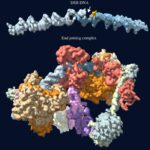Link to Pubmed [PMID] – 8045252
Link to DOI – 10.1002/j.1460-2075.1994.tb06623.x
EMBO J. 1994 Jul 15;13(14):3219-29.
The crystal structure of Thermus thermophilus aspartyl tRNA-synthetase (AspRS) refined at 2.5 A resolution is described. This molecular structure is a textbook illustration of the modular organization of aminoacyl-tRNA synthetases. In addition to the three domains found in yeast AspRS, each monomer exhibits a module specific to prokaryotic enzymes, which corresponds to a helix-turn-helix motif in yeast AspRS, a domain implicated in the stabilization of the complex with tRNA. Its topology matches that of the histidine-containing phosphocarrier HPr which has been linked recently to another group of proteins containing the ferredoxin fold. We propose a more extensive alignment of these folds, which involves a circular permutation of the sequences and changes the point of entry of the whole domain. The C-terminal extension, another prokaryotic characteristic, leads to a significant increase in the network of interaction at the dimer interface. Some potential communication pathways suggest how a transfer of information between the two active sites of the homodimer might occur. Most of the residues involved belong to the class II-specific motifs in correlation with the dimeric state of nearly all class II enzymes. The T. thermophilus enzyme exhibits some features not found in any of the six other known AspRSs from mesophilic organisms.

